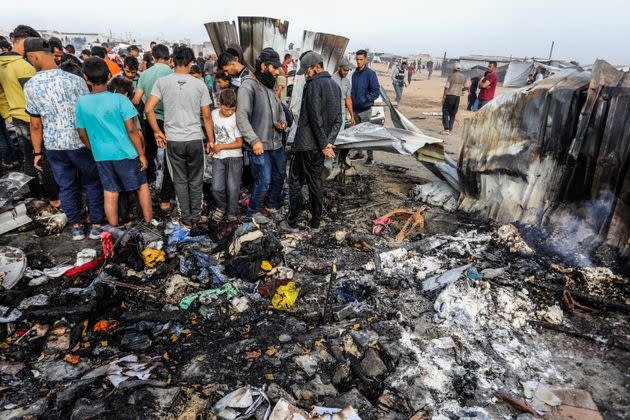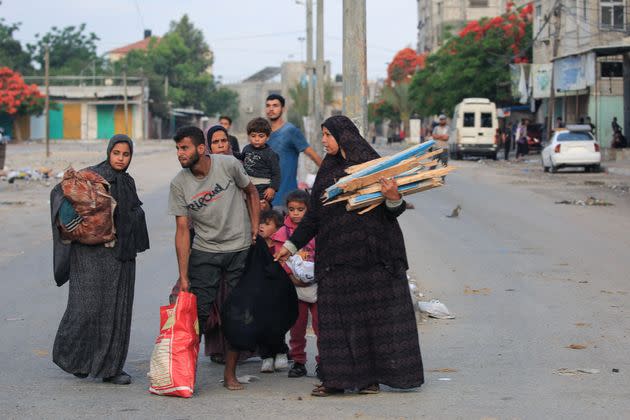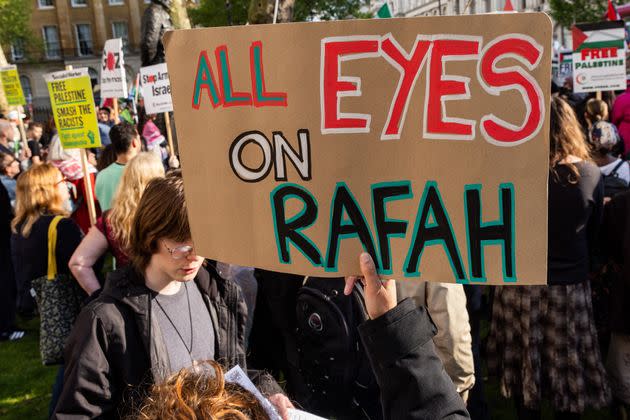Israel's Strike On Rafah Has Attracted The World's Outrage. Here's Why It Matters

Israel launched an air strike near the city of Rafah in Gaza over the weekend, killing dozens of Palestinians in one of the deadliest strikes of the war yet.
Israel previously designated Rafah a safe zone for more than a million displaced Palestinians to seek shelter, having pushed them out of the rest of Gaza over the course of its eight-month invasion.
More than half of Gaza’s entire population has been sheltering in Rafah.
The strike at the weekend therefore appears to have enraged the international community more than Israel’s previous attacks on the Palestinian territory.
Israeli PM Benjamin Netanyahu described the incident as a “tragic mishap”, but Israeli forces claim Rafah is one of Hamas’ last remaining strongholds – and so are expected to continue the bombardment.
Here’s what you need to know.
What happened in Rafah?
The Hamas-run health ministry says at least 45 people in a tent camp for displaced Palestinians were killed, with hundreds of others injured with severe burns, fractures and wounds, on Sunday.
There were reportedly around eight Israeli strikes on a camp that night, which triggered a deadly fire.
The death tally includes 12 women, eight children and three older adults, according to the ministry, with another three bodies burned beyond recognition.
At least 16 others were also killed in further attacks on Monday night.
The director of planning for the UN agency for Palestinian refugees, Sam Rose, told the BBC: “We cannot dismiss this as a simple accident.
“Women and children were killed in the most gruesome, the most brutal, of circumstances.”
It happened days after the International Court of Justice ordered Israel to halt any operations in Rafah which could cause further harm to the Palestinians.
However, it has no power to enforce this ruling as Israel is not a signatory to the ICJ.
Now, many Palestinians are desperately trying to leave Rafah.
According to the UN’s Relief and Works Agency for Palestinian Refugees (UNWRA), around one million people have fled the area in the last three weeks as Israel started to ramp up attacks.

How has the world reacted?
Israel is now facing intense pressure to explain how the attack happened.
The UN’s Security Council also called an emergency, closed-door meeting on Tuesday – on Algeria’s request – to respond to the strikes on Rafah.
The organisation’s Secretary General Antonio Guterres has already spoken out about the incident, saying the attacks are a “horror that had to stop” and there was “no safe place in Gaza”.
China has urged Israel to “stop its attacks on Rafah”, while the EU’s top diplomat Josep Borrell said the strike was “horrifying” and asked Israel to “fully respect” the ruling by the ICJ.
Germany’s foreign office said, “the image of charred bodies, including children, from the airstrike in Rafah are unbearable”.
The US, Israel’s top ally, said the images are “heartbreaking” but claimed Israel still had the right to defend itself.
Meanwhile, Spain, Ireland and Norway have formally recognised the state of Palestine today, in a move they hope will help support arguments for a two-state solution.
The strikes at the weekend have also strengthened support for the viral movement, All Eyes on Rafah.
This phrase meant to draw international attention to the humanitarian crisis in Gaza and the ongoing suffering of Palestinians under attack, and is being widely shared online.
How has Benjamin Netanyahu reacted?
The Israeli prime minister Benjamin Netanyahu described these events as a “tragic mishap”, but did not go into much detail.
“Despite our utmost efforts not to harm innocent civilians, last night there was a tragic mishap. We are investigating the incident and will obtain a conclusion because this is our policy,” he told the Israeli parliament on Monday.
Israel said its airstrike was precise and aimed at a Hamas compound where it killed two senior militants.
Netanyahu has previously vowed “absolutely victory” in Rafah, despite the rest of the world’s concerns about the risk to civilian life.
He repeated this on Monday, telling Israel: “I don’t intend to end the war before every goal has been achieved.”
Israel was not deterred by the ICJ’s plea for the attacks on Rafah to stop last week, either.
It pledged to continue the offensive because it claimed the ruling left room for the operation to continue.
Israel has repeatedly said its war is against Hamas, the militant group which killed 1,200 people on Israeli soil on October 7 and took a further 250 people hostage.
The Hamas-run health ministry says more than 36,000 Palestinians have been killed since the war began.
On Tuesday, Israeli tanks began to push further into Rafah, and have reportedly seized a key roundabout around half a kilometre away from the border with Egypt.


 Yahoo News
Yahoo News 